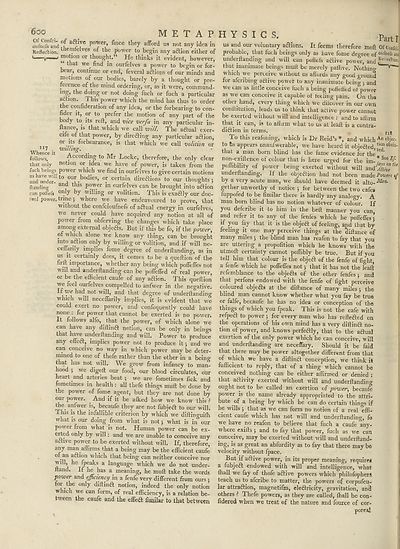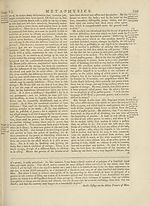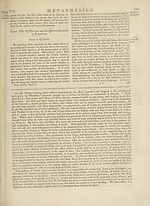Encyclopaedia Britannica, or, a Dictionary of arts, sciences, and miscellaneous literature : enlarged and improved. Illustrated with nearly six hundred engravings > Volume 13, MAT-MIC
(646) Page 600
Download files
Complete book:
Individual page:
Thumbnail gallery: Grid view | List view

6oo
Of Confci-
oufnefs and
Reflection.
v 117 .
Whence it
follows,
that only
fuch beings
as have will
and under-
ftanding
can poflefs
real power.
M E T A P
of aftive power, lince they afford us not any idea in
themlelves of the power to begin any aftion either of
1 motion or thought.” He thinks it evident, however,
that vve^ find in ourfelves a power to begin or for¬
bear, continue or end, feveral adtions of our minds and
motions of our bodies, barely by a thought or pre-
feience of the mind ordering, or, as it were, command-
ing, the doing or not doing fuch or fuch a particular
adhon. This power which the mind has thus to order
the confideration of any idea, or the forbearing to con-
fider it, or to prefer the motion of any part of the
body to its reft, and zi/ce verfa in any particular in-
ftance, is that which we call will. The adlual exer-
cife of that power, by direfting any particular adtion,
01. its forbearance, is that which we call volition or
willing.
According to Mr Locke, therefore, the only clear
notion or idea we have of power, is taken from the
power which we find in ourfelves to give certain motions
to our bodies, or certain diredlions to our thoughts j
and this power in curfelves can be brought into adtion
only by willing or volition. rihis is exadfly our doc¬
trine 5 where we have endeavoured to prove, that
without the confcioufnefs of adfual energy in ourfelves,
■we never could have acquired any notion at all of
power from obferving the changes which take place
among external objeas. But if this be fo, if the power,
of which alone we know any thing, can be brought
into aaion only by willing or volition, and if will ne-
celfarily implies fome degree of underftanding, as in
us it certainly does, it comes to be a queftion of the
firft importance, whether any being which poffelfes not
ill ai,d underftanding can be poflelfed of real power,
or be the efficient caufe of any aaion. This queftion
we feel ourfelves compelled to anfwer in the negative.
If we had not will, and that degree of underftanding
which will neceffarily implies, it is evident that we
could exert no power, and confequently could have
none . for power that cannot be exerted is no power.
It follows alfo, . that the power, of which alone we
can have any diftina notion, can be only in beings
that have underftanding and will. Power to produce
any effea, implies power not to produce it j and we
can conceive no way in which power may be deter¬
mined to one of thefe rather than the other in a being
that has not will. We grow from infancy to man¬
hood j we digeft our food, our blood circulates, our
heart and arteries beat ; we are fometimes fick and
fometimes in health : all thefe things muft be done bv
the power of fome agent, but they are not done by
our power. And if it be afked how we know this ?
the. anfwer is, becaufe they are not fubjeft to our will.
I his is the iniallible criterion by which we diftinguiffi
what is our doing from what is not; what is in our
power from what is not. Human power can be ex¬
erted only by will : and we are unable to conceive any
aftive power to be exerted without will. If, therefore,
any man.affirms that a being may be the efficient caufe
of.an action which that being can neither conceive nor
will, he fpeaks a language which we do not under-
ftand. If he has a meaning, he muft take the words
power and efficiency in a fenfe very different from ours :
for the only diftinift notion, indeed the only notion
which we can form, of real efficiency, is a relation be¬
tween the caufe and the effett fimilar to that between
HYSICS. partI
us and our voluntary anions. It feems therefore moft Of Confd.
probable, that fuch beings only as have fome degree of oufneh aw
underftan.ding and will can pofiels active power, and eaion'
that inanimate beings muft be merely pailive. Nothing
which we perceive without us aftords any good ground
for aferibing adtive power to any inanimate being j and
we can as little conceive fuch a being poilefied ol power
as we can conceive it capable ot teeling pain. On the
other, hand, every thing whic h we diicover in our own
conftitution, leads us to think that active power cannot
be exerted without will and intelligence : and to affirm
that, it can, is to aftum what to us at leaft is a contra-
didtion in terms. rij
To this reafoning, which is Dr Reid’s *, and which 4n objec-
to tis appears unanfwerable, we have heard it objedted, tl0,n obvi:1,
that a man born blind has the fame evidence for the ^'
non-exiftence of colour that is here urged for the im- * See ^
pofiibility of power being exerted without will and'SwH
underftanding. If the objediion had not been made Powers t/
by a very acute man, we ihould have deemed it alto- Man.
gether unworthy of notice 5 for between the two cafes
fuppofed to be limilar there is hardly any analogy. A
man born blind has no notion whatever of colour. If
you defenbe it to him in the beft manner you can,
and refer it to any of the fenfes which he poffeffes •
if you fay that it is the objedt of feeling, and that by
feeling it one may perceive things at the Siftance of
many miles ; the blind man has reafon to fay that you
are uttering a propofition which he knows with the
utmoft certainty cannot poffibly be true. But if you
tell him that colour is the objedl of the fenfe of fight,
a fenfe which he poffeffes not; that it has not the leaft
refemblance to the obje&s of the other fenfes j and
that perfons endowed with the fenfe of fight perceive
coloured objedts at the diftance of many miles 5 the
blind man cannot know whether what you fay be true
or.falfe, becaufe he has no idea or conception of the
things of which you fpeak. This is not the cafe with
refpedt to power 5 for every man who has refledted on
the operations of his own mind has a very diftindt no¬
tion of power, and knows perfedlly, that to the adlual
exertion of the only power which he can conceive, will
and underftanding are neceffary. Should it be faid
that there may be power altogether different from that
of which we have a diftindt conception, we think it
Efficient to reply, that of a thing which cannot be
conceived. nothing can be either affirmed or denied :
that activity exerted without wdll and underftanding
ought not to be called an exertion of power, becaufe
power is the name already appropriated to the attri¬
bute of a being by which he can do certain things if
he wills j that as we can form no notion of a real effi¬
cient caule which has not will and underftanding, fo
we have no reafon to believe that fuch a caufe any¬
where. exifts ; and to fay that porver, fuch as we can
conceive, may be exerted without will and underftand¬
ing, is as great an abfurdity as to fay that there may be
velocity without fpace.
But if adlive power, in its proper meaning, require*
a fubjedl endowed with will and intelligence, what
fliall we fay of thofe adlive powers which philofophers
teach us to aferibe to matter, the powers of corpufcu-
lar attradlion, magnetifm, eledlricity, gravitation, and
others ? T. hefe powers, as they are called, ffiall be con-
fidered when we treat of the nature and fource of cor¬
poreal
Of Confci-
oufnefs and
Reflection.
v 117 .
Whence it
follows,
that only
fuch beings
as have will
and under-
ftanding
can poflefs
real power.
M E T A P
of aftive power, lince they afford us not any idea in
themlelves of the power to begin any aftion either of
1 motion or thought.” He thinks it evident, however,
that vve^ find in ourfelves a power to begin or for¬
bear, continue or end, feveral adtions of our minds and
motions of our bodies, barely by a thought or pre-
feience of the mind ordering, or, as it were, command-
ing, the doing or not doing fuch or fuch a particular
adhon. This power which the mind has thus to order
the confideration of any idea, or the forbearing to con-
fider it, or to prefer the motion of any part of the
body to its reft, and zi/ce verfa in any particular in-
ftance, is that which we call will. The adlual exer-
cife of that power, by direfting any particular adtion,
01. its forbearance, is that which we call volition or
willing.
According to Mr Locke, therefore, the only clear
notion or idea we have of power, is taken from the
power which we find in ourfelves to give certain motions
to our bodies, or certain diredlions to our thoughts j
and this power in curfelves can be brought into adtion
only by willing or volition. rihis is exadfly our doc¬
trine 5 where we have endeavoured to prove, that
without the confcioufnefs of adfual energy in ourfelves,
■we never could have acquired any notion at all of
power from obferving the changes which take place
among external objeas. But if this be fo, if the power,
of which alone we know any thing, can be brought
into aaion only by willing or volition, and if will ne-
celfarily implies fome degree of underftanding, as in
us it certainly does, it comes to be a queftion of the
firft importance, whether any being which poffelfes not
ill ai,d underftanding can be poflelfed of real power,
or be the efficient caufe of any aaion. This queftion
we feel ourfelves compelled to anfwer in the negative.
If we had not will, and that degree of underftanding
which will neceffarily implies, it is evident that we
could exert no power, and confequently could have
none . for power that cannot be exerted is no power.
It follows alfo, . that the power, of which alone we
can have any diftina notion, can be only in beings
that have underftanding and will. Power to produce
any effea, implies power not to produce it j and we
can conceive no way in which power may be deter¬
mined to one of thefe rather than the other in a being
that has not will. We grow from infancy to man¬
hood j we digeft our food, our blood circulates, our
heart and arteries beat ; we are fometimes fick and
fometimes in health : all thefe things muft be done bv
the power of fome agent, but they are not done by
our power. And if it be afked how we know this ?
the. anfwer is, becaufe they are not fubjeft to our will.
I his is the iniallible criterion by which we diftinguiffi
what is our doing from what is not; what is in our
power from what is not. Human power can be ex¬
erted only by will : and we are unable to conceive any
aftive power to be exerted without will. If, therefore,
any man.affirms that a being may be the efficient caufe
of.an action which that being can neither conceive nor
will, he fpeaks a language which we do not under-
ftand. If he has a meaning, he muft take the words
power and efficiency in a fenfe very different from ours :
for the only diftinift notion, indeed the only notion
which we can form, of real efficiency, is a relation be¬
tween the caufe and the effett fimilar to that between
HYSICS. partI
us and our voluntary anions. It feems therefore moft Of Confd.
probable, that fuch beings only as have fome degree of oufneh aw
underftan.ding and will can pofiels active power, and eaion'
that inanimate beings muft be merely pailive. Nothing
which we perceive without us aftords any good ground
for aferibing adtive power to any inanimate being j and
we can as little conceive fuch a being poilefied ol power
as we can conceive it capable ot teeling pain. On the
other, hand, every thing whic h we diicover in our own
conftitution, leads us to think that active power cannot
be exerted without will and intelligence : and to affirm
that, it can, is to aftum what to us at leaft is a contra-
didtion in terms. rij
To this reafoning, which is Dr Reid’s *, and which 4n objec-
to tis appears unanfwerable, we have heard it objedted, tl0,n obvi:1,
that a man born blind has the fame evidence for the ^'
non-exiftence of colour that is here urged for the im- * See ^
pofiibility of power being exerted without will and'SwH
underftanding. If the objediion had not been made Powers t/
by a very acute man, we ihould have deemed it alto- Man.
gether unworthy of notice 5 for between the two cafes
fuppofed to be limilar there is hardly any analogy. A
man born blind has no notion whatever of colour. If
you defenbe it to him in the beft manner you can,
and refer it to any of the fenfes which he poffeffes •
if you fay that it is the objedt of feeling, and that by
feeling it one may perceive things at the Siftance of
many miles ; the blind man has reafon to fay that you
are uttering a propofition which he knows with the
utmoft certainty cannot poffibly be true. But if you
tell him that colour is the objedl of the fenfe of fight,
a fenfe which he poffeffes not; that it has not the leaft
refemblance to the obje&s of the other fenfes j and
that perfons endowed with the fenfe of fight perceive
coloured objedts at the diftance of many miles 5 the
blind man cannot know whether what you fay be true
or.falfe, becaufe he has no idea or conception of the
things of which you fpeak. This is not the cafe with
refpedt to power 5 for every man who has refledted on
the operations of his own mind has a very diftindt no¬
tion of power, and knows perfedlly, that to the adlual
exertion of the only power which he can conceive, will
and underftanding are neceffary. Should it be faid
that there may be power altogether different from that
of which we have a diftindt conception, we think it
Efficient to reply, that of a thing which cannot be
conceived. nothing can be either affirmed or denied :
that activity exerted without wdll and underftanding
ought not to be called an exertion of power, becaufe
power is the name already appropriated to the attri¬
bute of a being by which he can do certain things if
he wills j that as we can form no notion of a real effi¬
cient caule which has not will and underftanding, fo
we have no reafon to believe that fuch a caufe any¬
where. exifts ; and to fay that porver, fuch as we can
conceive, may be exerted without will and underftand¬
ing, is as great an abfurdity as to fay that there may be
velocity without fpace.
But if adlive power, in its proper meaning, require*
a fubjedl endowed with will and intelligence, what
fliall we fay of thofe adlive powers which philofophers
teach us to aferibe to matter, the powers of corpufcu-
lar attradlion, magnetifm, eledlricity, gravitation, and
others ? T. hefe powers, as they are called, ffiall be con-
fidered when we treat of the nature and fource of cor¬
poreal
Set display mode to:
![]() Universal Viewer |
Universal Viewer | ![]() Mirador |
Large image | Transcription
Mirador |
Large image | Transcription
Images and transcriptions on this page, including medium image downloads, may be used under the Creative Commons Attribution 4.0 International Licence unless otherwise stated. ![]()
| Permanent URL | https://digital.nls.uk/192692443 |
|---|
| Attribution and copyright: |
|
|---|
| Description | Ten editions of 'Encyclopaedia Britannica', issued from 1768-1903, in 231 volumes. Originally issued in 100 weekly parts (3 volumes) between 1768 and 1771 by publishers: Colin Macfarquhar and Andrew Bell (Edinburgh); editor: William Smellie: engraver: Andrew Bell. Expanded editions in the 19th century featured more volumes and contributions from leading experts in their fields. Managed and published in Edinburgh up to the 9th edition (25 volumes, from 1875-1889); the 10th edition (1902-1903) re-issued the 9th edition, with 11 supplementary volumes. |
|---|---|
| Additional NLS resources: |
|

